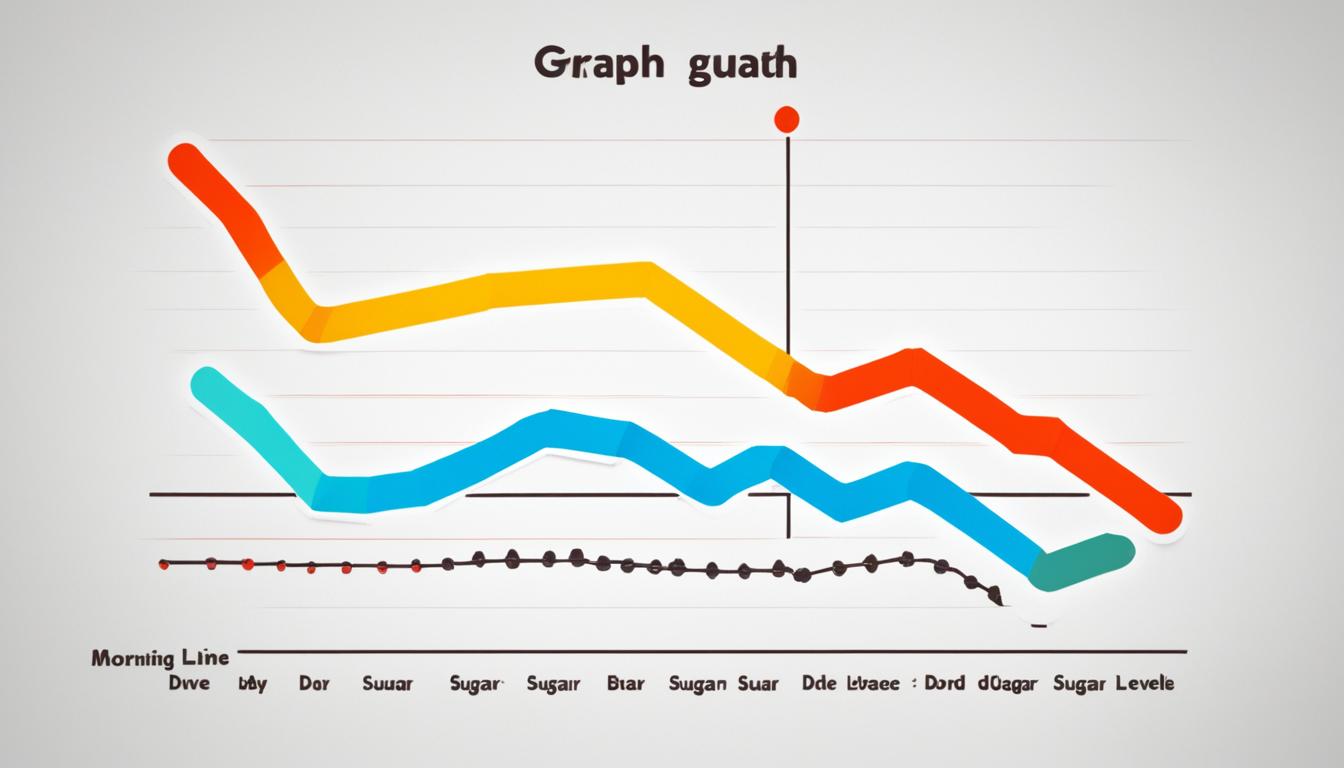Morning blood sugar levels can be higher compared to the rest of the day due to several factors. Have you ever wondered why your blood sugar levels are elevated in the morning, even though they are normal throughout the day? Understanding the reasons behind this phenomenon is crucial for effective diabetes management.
One common cause of high morning blood sugar is the dawn phenomenon. This occurs when hormones signal the liver to produce more glucose during the early morning hours. As a result, blood sugar levels can rise upon waking up.
Another factor that contributes to high morning blood sugar is waning insulin. Overnight, insulin levels may fall too low, leading to an increase in blood sugar levels. This can be a concern for individuals with diabetes who have insufficient insulin production or are insulin resistant.
Lastly, the Somogyi effect, although rare, can also lead to high morning blood sugar. This phenomenon occurs when low blood sugar during the night triggers the body to produce more glucose, resulting in elevated blood sugar levels in the morning.
To effectively manage high morning blood sugar, it is important to monitor blood glucose levels at different times of the day and identify the underlying cause. With this knowledge, you and your healthcare provider can develop strategies to optimize your diabetes management and maintain more stable blood sugar levels throughout the day.
The Dawn Phenomenon
The dawn phenomenon refers to the natural rise in blood sugar levels that occurs in the early hours of the morning. This phenomenon is triggered by the release of hormones such as cortisol and growth hormone, which signal the liver to produce more glucose. As a result, people with diabetes may experience elevated blood sugar levels in the morning, even if their blood sugar is well-managed throughout the rest of the day.
To effectively manage blood sugar levels throughout the day and lower morning blood sugar, it is important to understand and address the dawn phenomenon. One key strategy is to monitor glucose patterns and check blood sugar levels at different times, including bedtime, in the middle of the night, and upon waking up. This data analysis can help pinpoint the specific factors contributing to high morning blood sugar, such as inadequate medication or insulin dosages, improper meal timings, or the need for different insulin types.
Exercise can also play a role in managing morning blood sugar levels. However, it is important to exercise caution to avoid overnight hypoglycemia. Working closely with healthcare providers to develop an individualized plan is crucial to effectively manage morning blood sugar levels and maintain overall diabetes control.

In the next section, we will explore another factor that can contribute to elevated morning blood sugar levels – waning insulin.
Waning Insulin
Waning insulin is a common factor contributing to higher blood sugar levels in the morning. It refers to a decrease in insulin levels during the night, leading to elevated blood sugar levels upon waking up. Inadequate basal insulin doses or early injection timings for long-acting insulin can contribute to this issue. To address waning insulin, it is important to make adjustments in insulin regimens.
One way to address waning insulin is by adjusting the timing of insulin injections. This can help ensure that insulin levels remain balanced throughout the night, preventing blood sugar spikes in the morning. Another option is to switch to different types of insulin that may be more effective in regulating blood sugar levels.
Monitoring blood sugar levels throughout the day is crucial for optimizing blood sugar regulation. By tracking blood sugar patterns, individuals can gain insights into the effectiveness of their insulin regimens and make necessary adjustments. This proactive approach can help reduce morning blood sugar spikes and promote better overall blood sugar control.
It is important to work closely with healthcare providers to determine the right medication and lifestyle strategies to manage waning insulin and reduce morning blood sugar spikes. Healthcare professionals can provide personalized guidance based on individual needs and help individuals develop effective strategies for blood sugar regulation during the day.
The Somogyi Effect
In the realm of morning blood sugar management, the Somogyi effect plays a significant role. This phenomenon occurs when low blood sugar levels, often caused by skipping meals or taking excessive insulin, trigger the body to compensate by producing more glucose. The result? High blood sugar levels in the morning.
To effectively manage morning blood sugar, it’s crucial to monitor glucose levels throughout the night. This allows for identification of whether the Somogyi effect is the culprit behind high morning blood sugar. If it is, adjustments in insulin dosages, meal schedules, and medication timings may be necessary to regain control and prevent the rebound effect.
An individualized plan for morning blood sugar management can be developed through close communication with healthcare providers. Collaborating with professionals who specialize in diabetes care will ensure tailored strategies and optimal outcomes for managing high morning blood sugar levels.

Identifying the Somogyi Effect
One effective way to identify the Somogyi effect is by monitoring blood sugar levels at different times during the night. By tracking these levels, patterns may emerge, shedding light on whether the rebound effect is responsible for high morning blood sugar. Armed with this information, healthcare providers can work with individuals to create a comprehensive and personalized management plan.
Diabetes management requires a multidimensional approach, encompassing adjustments to insulin dosages, meal planning, and medication timings. By addressing the Somogyi effect through careful analysis and tailored interventions, individuals can regain control over their morning blood sugar levels, ultimately leading to better overall diabetes management.
Taking Control of Morning Blood Sugar
In order to effectively manage high morning blood sugar levels, it is crucial to understand the various factors that contribute to this phenomenon. By identifying the specific cause behind elevated blood sugar levels in the morning, individuals can make targeted adjustments to their diabetes management regimen.
Some common strategies for managing high morning blood sugar include:
- Consulting healthcare providers for medication and insulin dosage adjustments
- Monitoring blood sugar levels at different times during the night
- Fine-tuning meal plans to account for glucose production during early morning hours
- Adjusting the timing of medication and insulin doses
With the right combination of adjustments and healthcare guidance, individuals can regain control over their morning blood sugar levels, leading to improved overall blood sugar management and a healthier lifestyle.
Reaping the Benefits of Morning Blood Sugar Control
Managing high morning blood sugar levels is not only vital for immediate well-being but also for long-term health outcomes. Consistently elevated blood sugar can contribute to complications associated with diabetes, such as cardiovascular disease, kidney damage, and nerve damage. By effectively managing morning blood sugar, individuals can reduce the risk of these complications and improve their overall quality of life.
Developing personalized strategies for morning blood sugar management, while working closely with healthcare providers, puts individuals on a path towards better blood sugar regulation. By staying diligent in monitoring blood glucose levels, making necessary adjustments, and following recommended lifestyle modifications, individuals can achieve optimal morning blood sugar control and lead a healthier life with diabetes.
Conclusion
Managing blood sugar levels throughout the day, especially in the morning, can be a challenge for individuals with diabetes. However, with careful monitoring and the right interventions, it is possible to achieve better blood sugar control and overall diabetes management.
Understanding the various factors that contribute to high morning blood sugar, such as the dawn phenomenon, waning insulin, and the Somogyi effect, is crucial in developing effective strategies for morning blood sugar control. By closely working with healthcare providers, individuals can create personalized plans that involve monitoring blood sugar patterns, making appropriate adjustments to medication and insulin dosages, optimizing meal timings, and incorporating exercise routines.
By diligently monitoring blood sugar levels throughout the day, individuals can identify patterns and make necessary adjustments to their diabetes management plan. This helps reduce the risk of complications associated with consistently elevated blood sugar and promotes long-term health.
In conclusion, achieving optimal blood sugar regulation and morning blood sugar control requires a proactive approach that involves understanding the underlying factors, making informed adjustments, and collaborating with healthcare providers. By implementing these strategies, individuals can experience improved blood sugar patterns throughout the day and better overall diabetes management.




